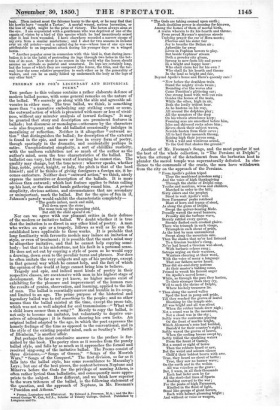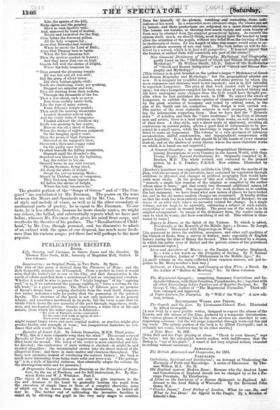FREEMAN AND COX'S LEGENDARY AND HISTORICAL
POEMS.* THE preface to this volume contains a rather elaborate defence of modern ballad poems, with some general remarks on the nature of the ballad. We scarcely go along with the able and agreeable ad- vocates in either case. The true ballad, we think, is something more than "a narrative embodying any striking event or scene, the outward action of which is presented with more or less of vivid- ness, without any minuter analysis of inward feelings." It may be granted that story and description are prominent features in ballads ; but discourse or monologue—utterance by the characters —is also frequent ; and the old balladist occasionally indulges in moralizing or reflection. Neither is it altogether "outward ac- tion" that distinguishes the ballad ; for description of the external is found in the epic, and more -or less in every form of poetry, though sparingly in the dramatic, and accidentally- perhaps in satire. Unsophisticated simplicity, a sort of childlike rusticity, with the uniform exhibition not so much of the author as the author's mind, seem the tame characteristics of the ballad. The balLadist can vary, but from want of learning he cannot rise. The quality may change, but the tone never : whoever speaks, whether king, noble, priest, knight, or lady, the pitch is that of the bard himself; and if he thinks TN of giving foreigners a foreign air, it be- comes caricature. Neither does "outward action," we think, nicely express the narrative or description of the ballads. It is more obvious than outward ; which last feature applies to Satan calling up his host, or the startled bands gathering roand him. A primal simplicity, obvious actions, and circumstances that are secondary or unimporta.nt, mark the ballad. But for the spice of fun in it, Johnson's parody would exhibit the characteristic completely- " The gentle infant, meek and mild,
Fell down upon the stone-
The
muse took Alp the squealing child, But still the child squeard on."
Nor can we agree with our pleasant critics in their defence of the modern or imitative ballad. We doubt whether it is true that the imitation is so direct in any other kind of poetry. A man who writes an epic or a tragedy, follows as well as he can the established laws applicable to those works. It is probable that long familiarity with favourite models may induce an imitation of style, or even of treatment ; it is possible that the man's mind may be altogether imitative, and that he cannot help copying some- body : but that is his misfortune, not his fault in a personal sense. He does not set out by copying a style of poem as -he would copy a drawing, down even to the peculiar turns and phrases. Nor does he often imitate the very subjects and age of his prototype, except in that general way which he cannot help, and the fact of which the opinion of the world at large cannot bring him to believe. Tragedy and epic, and indeed most kinds of poetry in their respective classes are coextensive with man in his highest stage of development. Sc, far as we yet know, no higher means exist of exhibiting for the pleasure and improvement of the human race the results of genius, observation, and learning, applied to the life of man. The ballad is essentially narrow and humble in its scope, and limited to an age. The prime purpose of the historical and legendary ballad was to tell something to the people; • and no other means than the ballad existed at the time, except the prose tale which was not so well adapted for oral transmission—" W' hat will a child learn sooner than a song ? " Merely to copy the ballad, is not only to become an imitator, but voluntarily to deprive our- selves of advantages : it is Samson shearing his own locks. An original ballad adapted to the age, in which the poet expresses the homely feelings of the time as opposed to the conventional, and in the style of the existing popular mind, such as Southey's "Battle of Blenheim," is another affair.
But perhaps the most conclusive answer to the preface is fur- nished by the book. The poetry rises as it recedes from the purely ballad style, and falls by as much as it approaches the formal and received sing-song of the imitative ballad. The Poems consist of three divisions,—" Songs of Greece," "Songs of the Moorish Wars," "Songs of the Conquest." The first division, so far as it falls into the ballad style, has some resemblance to Macaulay's Lays ; but one of the best pieces, the contest between Neptune and Minerva before the Gods for the privilege of naming Athens, is often rather lyrical than balladistic, and consequently more appro- priate to the subject. How different, and we think how superior to the worn triteness of the ballad, is the following statement of the question, and the approach of Neptune, in Mr. Freeman's "Poseidon and Athena.'
• Poems, Legendary and Historical. By Edward A. Freeman, ld.A.; and the Re- verend George W. Cox, S.C.L., Scholar of Trinity College, Oxford. Published by Longman and Co.
"The Gods are taking counsel upon earth ; Each deathless power is choosing forth own, Among the homes of them of mortal birth, A realm wherein to fix his hearth and throne.
From proud Mycenw's spacious streets Undying prayer the ear of Hera meets ; Phcebus and his sister fair Joy to breathe the Delian air ; Aphrodite far away Loves in Paphian bowers to play. But beside Cephisus' stream Doth a prouder city gleam, Sprung to new-born life and power In a bright and happy hour : Who shall claim her forth own ?
Who shall fix his hearth and throne In the land so bright and fair, Beyond Apollo's home and Hera's queenly care ?
"Now before the deathless train Stand the mighty rivals twain ; Bounding o'er the waves afar Came Poseidon's glittering car; One strong hand with well-cut rein Guides the horses of the main, While the other, high in air, Doth the lordly trident bear. As he hastens on his way, All around the dolphins play; All the monsters of the deep On his wheels attendance keep- Foaming seas are smoothed before him, Isles and shivered rocks adore him ; Rivers check their subject waves, Nereids hasten from their caves ; All to hail their monarch throng, Raising high their joyous song, With a wild and wondrous sound, To the God that shakes the ground."
Another of Mr. Freeman's Songs, and the most popular if not the best of the whole collection, is "The Persians at Delphi" ; when the attempt of the detachment from the barbarian host to plunder the sacred temple was supernaturally defeated. In obe- dience to the commands of the oracle, the men have withdrawn from the city on the approach of the Persians.
"From Apollo's golden tripod Thus the maddened priestess sang ; And the voice of high thanksgiving Through the shrine of Delphi rang. Youths and maidens, wives and children, Marched in order to the hill; Sixty elders and the prophet Stood to wait Apollo's will. Soon Parnassus' peaks reEchoed Blast of horn and tramp of steed, As along the glens of Delphi Swept the quiver-bearing Mede. Proudly waved the royal banners, Proudly did the turbans wave, Sternly rattled every quiver, Sternly flashed each crooked glaive. There was triumph in each visage, Triumph in each shout of pride, As the host by man unnumbered Swept along the mountain side. Then the shades that ne'er had listened To a Grecian buckler's clang, Ne'er had heard a Grecian war-shout, With barbaric echoes rang ; Satraps urging on their warriors, Warriors cheering at their word, With the voice of many a language That our fathers never heard.
Thus did six-and-forty nations At their master's bidding come, Primed to wreak his fiercest anger On Apollo's sacred home ; While, as through the pass they hasten, To their stranger Gods they cry, Well to sack the shrine of Delphi, Where his holy treasures lie.
"Thus along the sacred valley Sped the host in pomp and pride, Till they reached the groves of laurel Blooming by the temple side. All was bright and all was silent When the robber bands drew nigh; Not a sound was in the mountain, Not a cloud was in the sky ; Softly were the sunbeams playing On the front of marble bright, Which Alcmreon's sons had blinded, Banish'd for their country's right ; Softly waved the groves of laurel, When the cooling breeze swept by, Softly trilled the sparkling waters From the fount of Castaly.
Not a sound or sight of terror Then the robbers heard or saw, But the weird and solemn silence Chill'd their boldest hearts with awe.
True, they heard no shout of battle; True, they saw no banner wave ; On the earth and in the welkin All was voiceless as the grave : But, I wean, in all their thousands Each had liefer seen by far All the steel-clad lines of Sparta
Rushing onward to the war ;
For the peaks of high Parnassus, Kindled in the flood of light, Stood like groups of giant heroes, Each with helmet gleaming bright ; And without or voice or weapon, Like the spirite of the hill, Silty eiders andthenrophet Stood to wait.Apollth will; And unniovedby handof-mortal„ Bright sadburnished for-the fray; Close Wore. the:foremost.
All the holy weaponslay; Arms that Herealea.had.wielded
When be smote the Lord, of Hell;. Arms that Theseus bore-to 'battle
When the fair Ansazons.felL Then the spoilers quaked. in..herrori,
And they knew that one,onligli Guards full well the.shrine. of:Delphi,
Where hie holy treasures lie..
"Thus around-the gleaming temple
All was fair and all was still.;
But' the grasp of silent terror Did their beldeatapirits chill: Teeth are chattering, limbs. are-quaking, Dropped are scimitar and bow„ Eyes are starting from-their sockets, 'fhrough.the.tlmuaands ef the foe. Then a war-shout, such as never Rose from earthly battle-field,. Like the roar of many waters,. From Athena's temple pealed; Then amid the heaving mountains Loudest thunders echoed nigh, And the ruddy bolts of vengeance Flaahed.uthwart the cloudless sky.
Earth was quaking to her centre,. Heaven was all a sheet offiame„ When the stroke of righteous judgment On the haughty spoiler came. Then the peaks,of high Parnassus Shivered at, the tempest's blow, Showered a. thousand craggy ruins On the guilty ones below. Crushed beneath the falling mountains, Stunned amid. the. thunder's din,
Scorched and blasted-by the lightning,
Lay the robber in.hia sin. Onward borne in one wild torrent, Flying-footman, flying steed, All along-the glens of-Delphi Swept the quiver-bemingMede ; Struck by Plicebus: arm of. vengeance, They had. seen their bravest, die, All before the shrine of Delphi,.
Where his, holy treasures-lie."
The greater portion of the "Songs of Greece" and of "The Con- quest" are contributed by Mr: Freeman. The-poems on the wars between the Moors and Spaniards are all by Mr- Cox, In fluency
of style and melody of .verse, as well as. in the other secondary or
mechanical parts of poetry, he Is:equal. to-Mr. Freeman. To our taste, he is less effective, bemuse. he more. closely copies, wemight any echoes, the ballad, and substantially repeats what we have met before, whereas Mr. Freeman often gives his mind freer scope, and overlooks the theories of: his preface:. The "Recollections of Child- hood," by Mr. Cox, though personal,. and too- discursive to admit of an extract with the space-at our disposal, has much more fresh- ness than his various songs; yetthese.last will perhaps be the most Popular.



























 Previous page
Previous page